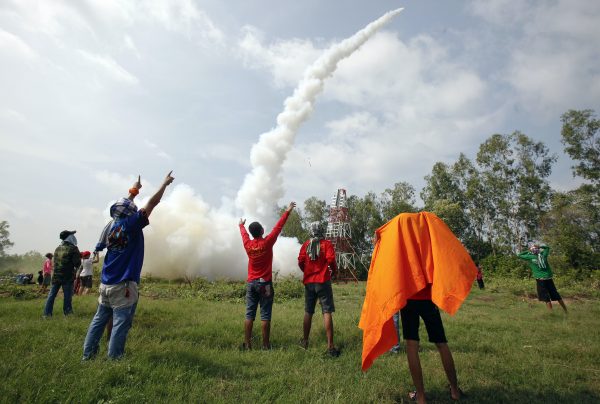The lasting economic impact of the COVID-19 pandemic and the intensifying pro-democracy protest movement will reaffirm the contemporary trendline in Sino-Thai defence cooperation. This cooperation will occur for the short-to-medium risk horizon and for the medium-to-long risk horizon.
Yet Sino-Thai defence cooperation does not presently extend to the same degree in the development of space technology. This is indicated by the latest developments from the Royal Thai Air Force (RTAF) Space Operation Center in partnership with the Geo-Informatics and Space Technology Development Agency (GISTDA) — a Thai space agency responsible for remote sensing and satellite technology development.
These organisations’ space procurements increasingly show a preference for non-Chinese technology and launch service providers. The RTAF procured its NAPA-1 and NAPA-2 U6 CubeSat platforms — Thailand’s first and second military satellites — from Innovative Solutions in Space of the Netherlands. While the first satellite was launched through the French Arianespace Vega rocket at the Guiana Space Centre in French Guiana, the latter is scheduled for launch through the Soyuz rocket at the Vostochny Cosmodrome in Russia. GISTDA also signed a contract with Airbus for the THEOS-2 satellite, a second generation low Earth orbit (LEO) observation system that will replace the THEOS-1 satellite.
Relevant officials in the latest round of draft revision on the forthcoming National Space Act for the National Space Policy Committee have said off the record that there is little indication that either China’s space industry or a domestic lobby will receive a comprehensive edge. It seems that the drafters sought to uphold Deputy Prime Minister General Prawit Wongsuwon’s ‘NewSpace’ agenda to focus on domestic space technology and sustainable economic development.
Despite also confirming that the RTAF sent representatives to participate in the latest round, its influence amid the process remains unclear. The RTAF’s most explicit articulation of the space domain is found in the White Paper 2020. The document’s ‘10-Year Requirement Plan [2020-2030]’ section conveys its intent to invest in space capabilities and space situational awareness. But it does not show any signs of a shift towards procuring Chinese technology.
If anything, both the RTAF and GISTDA tend to reject Chinese technology in favour of Western technology. As a case in point, the RTAF signed an agreement to cooperate on space situational awareness with the United States Strategic Command. This laid the groundwork for a long-term relationship between the two countries through information sharing.
In turn, GISTDA promoted the United States Space & Rocket Center’s Discover Thailand’s Astronauts Scholarship Program — an annual scholarship for three Thai students to study at the National Aeronautics and Space Administration (NASA) — during Thai Space Week 2019. This was Thailand’s first space exhibition. Thai Space Week 2020 was postponed due to the COVID-19 pandemic. Furthermore, the Royal Thai Government Pollution Control Department in partnership with GISTDA was on the development team for NASA’s SERVIR–Mekong Air Quality Explorer Project that created a web application to help mitigate the impact of air pollution in Thailand.
But there are concerns that the newly appointed Executive Director, Pakorn Apaphant, signals a shift towards newfound acceptance of Chinese satellite technology and launch service providers. His arrival comes shortly after the enactment of the Act on Organisation to Assign Radio Frequency and to Regulate Broadcasting Telecommunications Services (No. 3) (2019). This grants permission for foreign satellite operations to provide domestic services byliberalising the three-decade-long cumbersome concession regime.
Colonel Setthapong Mali Suwan, Vice-Chairman of Telecommunications for the Ministry of the Digital Economy and Society, publicly expressed this concern in a recorded interview several weeks ago. He stated that Thailand should maintain its traditional balancing role in competition over space affairs between great powers or else it will be required to follow policies dictated by other states and that there is ‘a need to urgently promote the development of the country’s own space technology’ to prevent a loss of bargaining power.
Even though the contemporary trendline in Sino-Thai defence cooperation stands overall, Thailand’s space program has not drifted into China’s orbit. There are political elites inside of the Thai state bureaucracy that still give hope that the country may, in time, successfully operationalise a multi-directional diplomacy.
Hadrien T Saperstein is a researcher at the Asia Centre, Paris.

